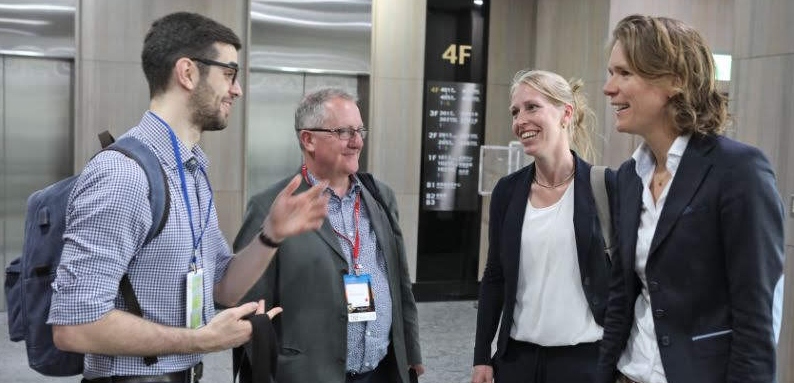
Toward Tinnitus Subtyping: or Finding a Key for Each Keylock
By Jorge P. Simoes, University of Regensburg
Dearest members of the Tinnitus Talk community,
My name is Jorge Simoes and I’m a PhD student in Regensburg, Germany, under the supervision of Dr. Winfried Schlee, Prof. Nathan Weisz, and Prof. Berthold Langguth. My interest in tinnitus sparked in 2016, when I developed tinnitus myself while I was a Master’s Student in Neurosciences. Like many of you, I went to a GP only to be scorned at: “Oh, that’s just tinnitus.” Since then, I decided to pursue an academic career in the field, and hopefully the insights of my work will translate into better care for tinnitus patients. On a personal note, my tinnitus is quite manageable; only during periods of great stress am I really annoyed by it, especially before sleep and exams.
I am one of the 15 students participating in the European School of Interdisciplinary Tinnitus Research (ESIT). ESIT students look into different aspects of tinnitus, such as the potential benefits of acoustic treatments and transcranial magnetic stimulation, the effects of hearing aids and cochlear implants, the effects of neurofeedback, improving cognitive behavior therapy for tinnitus, tinnitus epidemiology, the genetics of tinnitus, basic auditory neuroscience, and much more.
My work aims to subtype tinnitus. We can “decompose” tinnitus into many different elements: type of perceived sound, tinnitus caused by noise-trauma or by age-related hearing loss (just to name a couple of common tinnitus triggers), degree of accompanying hearing loss, presence of hyperacusis, bothersome versus non-bothersome tinnitus, and so on and so forth. I usually compare tinnitus heterogeneity with the picture below. It shows snacks with different characteristics: they differ in taste, shape, size, texture, flavour… However, it is not so difficult to separate the nuts from the raisins, and those two from the skittles.

Separating tinnitus into different types, however, presents some challenges. What are the “raisins”, “nuts”, and “skittles” of tinnitus? That’s what my work focuses on.
One can wonder why subtyping tinnitus is so important to begin with. We hypothesize that different patients will need different treatments depending on the flavour, texture, and shape of their tinnitus. For instance, we already know that cochlear implants can reduce tinnitus for patients with single-sided deafness. In other words, we know that cochlear implants benefit a subtype of patients. Also, we see in our clinical practice that certain treatments are working really well for some patients, while other patients are simply not responding to it. We often do not know why only a subset of patients improve, but we believe that tinnitus heterogeneity is a plausible explanation. Other clinicians and researchers share this opinion and this experience in their clinical work, and discussions on the Tinnitus Talk forum hint at a similar phenomenon.
“Heterogeneity” and “subtyping” are two words that are part of the zeitgeist in the tinnitus field. We hope that a greater understanding of them will translate into personalised treatments. Maybe, just like each keylock needs a specific key, each tinnitus patient needs a specific treatment.
Subtyping and Tinnitus Talk
When I started my PhD, my supervisor introduced me to Markku and Steve. They had an incredible dataset from a survey conducted in 2016 among members of the Tinnitus Talk forum. We had a lot of information about patients’ characteristics, the treatments they had tried, and their outcomes. We first investigated whether the outcome of a treatment (for example, neurofeedback) could be used to predict the outcome of a second treatment (for example, acoustic stimulation). We presented the results last year at the Tinnitus Research Initiative (TRI) conference, and the poster is available here.
Although a highly relevant question, we faced two shortcomings. First, we did not know the order in which treatments were conducted (for example, neurofeedback first, and acoustic stimulation second), which limited the interpretation of the results (we could talk about statistical associations, but no “directionality”). And second, it was difficult to generalize our results because the same treatment could have very different characteristics. For example: Transcranial Magnetic Stimulation (TMS) can be administered with a wide range of settings, such as number of sessions, pulses per session, stimulation frequency, position of the coil, etc. This means that the experience of TMS could be very different between two persons, but in our analysis, we only had one variable called “TMS”.
So, we decided to change our research question. Instead of looking at treatment outcomes to predict the outcome of other treatments, we decided to take a step back and ask a more fundamental question: Are treatment outcomes influenced by an individual’s characteristics (age, gender, hearing loss, hyperacusis etc…), or tinnitus characteristics (time since onset of tinnitus, laterality, somatic tinnitus), or treatment characteristics (for this analysis we had a single variable at our disposal: how long the treatment lasted)? The results were published earlier this year.
Overall, we saw that different individual and tinnitus characteristics were more or less important depending on the treatment. From a statistical standpoint, those characteristics could explain little of treatment outcomes when looked at individually. However, once combined, they could give some hints on why a subset of individuals respond to a given treatment. For instance, we observed that patients whose tinnitus is attenuated by sounds were experiencing a better response to treatments with an auditory component (like Notched Music, Hearing Aids, Cochlear Implants, Maskers, etc.).

What the future awaits
We believe that this line of research should be further explored in the future. Personality, coping strategies, stress levels, quality of sleep, life history, and mood represent some personal characteristics that can be further explored in the context of tinnitus subtyping. These could explain why people experience tinnitus differently and why some people are responsive to some treatments or not responsive to any treatment at all. Regarding treatment characteristics, we can look at treatment duration, whether it involved groups sessions, whether it combined multiple treatments simultaneously, etc. Eventually, we would also like to investigate whether neural signals, as recorded by instruments such as electroencephalogram (EEG), have prognostic value. For example, we know that the effects of a treatment such as transcranial magnetic stimulation depends on the rhythms of the brain (as recorded by EEGs) prior to the intervention.
Connecting patients and researchers
Regarding Tinnitus Hub, I am a big fan of so-called Citizen Science. I agree that there’s a colossal gap between researchers and the community and bridging it should be a priority to researchers. Not only my group and I have some ambitious plans for more crowdsourced, participative research in the future (so stay tuned ?), we also received some incredible feedback from the community, and we already have a couple of ideas on how to further explore the data we have available from Tinnitus Hub. Also, we are constantly thinking about how to further strengthen our already prolific collaboration; working with Hazel and Markku brings me great joy, and I am very enthusiastic about this alliance.
Please feel free to contact me at jorge.simoes@ukr.de

8 Comments
When I first developed my tinnitus almost eight years ago, my ENT physician said it was due to my TMJ and my oral surgeon said that it wasn’t but was an ENT problem. Since then I’ve also been diagnosed with cervical spine stenosis and some hearing loss. My tinnitus is 24/7 with sleep being my only escape. I’ve not been able to find a medical professional in the Boston, MA USA area to evaluate my issue. Meditation, and learning to ignore the sounds in my head are my coping mechanisms, although at times the loudness can be quite infuriating. So much needs to be done with this increasing medical issue for all of us affected by this condition. Interesting enough, my tinnitus kicked in when I stopped drinking alcohol…
I am south of Boston, and I too wish there was a clinical study or ANY study for tinnitus nearby! It makes me sad especially when I’ve had a good day and I’m looking forward to slipping into bed and hugging my pillow. My tinnitus is crazy loud.
I imagine what would happen if the doctors and researchers were told to wear a device that mimics tinnitus, for only 3 days??
I don’t understand why the doctors I have seen suggest to just ignore the tinnitus?!
In the beginning I welcomed death. Now I want to bury tinnitus for EVERYONE! ?
Mine started a year after I quit drinking too! I thought I was doing something great for myself but stopping alcohol consumption. No more cigarettes either! Then bam – annoying tinnitus for an unexplained reason. A great irony.
On 12/14/2019, while lying in bed really stressed out, I rolled over and my ears started ringing. I attempted to tough it out at work which lasted a month (I wasn’t sleeping). On 1/12/2020, I was at work but couldn’t concentrate. A buddy of mine rushed me down to the emergency room at Massachusetts Eye and Ear Boston, MA USA. They could not find anything wrong with me. However, they did not perform a CT Scan or MRI? On another visit to a different emergency room they did perform a CT scan which was negative. To make a long story short, I have not been back to work yet. I am currently active in my treatment with a chiropractor, acupuncture and psychologist. I want nothing more than to regain my health and return to work. I don’t drink alcohol, no caffeine, mostly eliminated sugar and working on reducing my stress levels through Mindfulness and Psychologist. IMO… The medical community needs to get a handle on tinnitus. While at the present time there is no cure, no one with their head ringing off their shoulders standing in the Emergency Room wants to hear Sorry Son you will have to learn to live with it. They need to know everything that all of us here seem to know about the available treatment options to manage tinnitus. Hell give the person who is suffering some hope… don’t rob them of it…
I have tinnitus, had it for over 25 years now, at first it was just small silly noises in both ears, I couldn’t hear it outdoors, only when I was laying down to sleep, but the noises didn’t bother me at all, got on with my life.
But about 12 years ago, after I had someone come to my home to do reflexology on my feet, it changed over night, to a really horrible sound, and I’ve never been right since. Masking, and hearing aids were given to me, but now I hear it all the time, except I do have some good days where I hardly hear it. I have one ear that is bothering me with pain, I think the pain is because of the Eustachian tube, it feels blocked. I have tried all sorts of things to get the pain cleared, but it keeps coming back, and this is when my tinnitus becomes much worse, too loud, and I feel depressed, and have a lot of anxiety.
I give up some days, please help.
I have very loud tinnitus and have had it for 40 years. It is due to otosclerosis. Hearing aids help some. The only thing that works for me is finding things to do that distract me from hearing the noise. This is not easy and you need to train the brain to do this and it takes years..
I´m a tinnitus researcher in Brazil and I just found Tinnitus Hub. Loved this blog post! Earlier this month I was on a Tinnitus Summit here in my country and we were learning and discussing exactly this question about subtyping or heterogeneity of tinnitus. I really want to do a great job with my colleagues here in our research group.
Thank you for all your work!
Best comment I’ve heard for a long time from Cynthia… I think all otolaryngologists (ENT) should spend a week with tinnitus sounds played by a headset. Then they might not be so dismissive of their patients.
Write a Comment
The Time Is Now — Tinnitus Sufferers Take the Lead in Research
By Hazel Goedhart, Director of Tinnitus Hub It was the moment I had been working towards for years; presenting at the Tinnitus …
When Will We Finally Get a Voice in Tinnitus Research?
By Hazel Goedhart, Director of Tinnitus Hub Imagine being invited to join a group holiday, only to find out you will be travelling …
Here’s Why the Jury’s Still Out on Lenire
By Hazel Goedhart, Director of Tinnitus Hub You’re suffering from tinnitus and you’ve heard of this new treatment called …
Categories
Tags
Research Opportunities
Work with us and tap into the power of the patient population.
Read moreMore About Us
About Us Contact Us
Donate
Functional Always active
Preferences
Statistics
Marketing